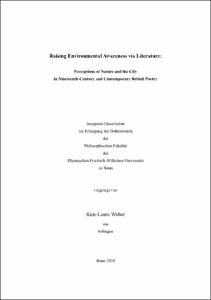Weber, Kim-Laura: Raising Environmental Awareness via Literature : Perceptions of Nature and the City in Nineteenth-Century and Contemporary British Poetry. - Bonn, 2020. - Dissertation, Rheinische Friedrich-Wilhelms-Universität Bonn.
Online-Ausgabe in bonndoc: https://nbn-resolving.org/urn:nbn:de:hbz:5-57482
Online-Ausgabe in bonndoc: https://nbn-resolving.org/urn:nbn:de:hbz:5-57482
@phdthesis{handle:20.500.11811/8317,
urn: https://nbn-resolving.org/urn:nbn:de:hbz:5-57482,
author = {{Kim-Laura Weber}},
title = {Raising Environmental Awareness via Literature : Perceptions of Nature and the City in Nineteenth-Century and Contemporary British Poetry},
school = {Rheinische Friedrich-Wilhelms-Universität Bonn},
year = 2020,
month = feb,
note = {This dissertation examines the connections between various poetic representations of our spatial surroundings and their development over time by analyzing selected examples of nineteenth-century and contemporary British poetry.
In a first step, it compares depictions of nature in Romantic poetry to images of cityscapes (including city life) in poems from the Victorian Period with a special focus on the ways people’s experiences of and reactions to these contrasting surroundings are represented. Secondly, it offers selected analyses of depictions of nature and/or the city in contemporary poetry, which then allows for a comparison that highlights trends in the perception of these different environments through time. Examining poetry from around the time of the Industrial Revolution, when many people’s surroundings changed radically, and poetry that was produced more recently reveals the initially prominent construction of a duality of nature and the city (which has been dissolved more and more over time), but also many similarities in the poets’ ways of portraying these different types of environment. Literary imagination of the environment is juxtaposed with thoughts on ‘real’ nature and cities, which involves links with studies in environmental psychology, geography, trends in landscape planning, etc. as well as drawing upon concepts from environmental literary theory.
The fact that poetry from more than 200 years ago gives proof of an environmental consciousness, deep ecological thoughts, and an urban skepticism that is similar to what is gradually being rediscovered by our society today shows that a study of the literary representations of our spatial surroundings over time might foster a better understanding of our relationship to and responsibility for the natural and non-natural world.},
url = {https://hdl.handle.net/20.500.11811/8317}
}
urn: https://nbn-resolving.org/urn:nbn:de:hbz:5-57482,
author = {{Kim-Laura Weber}},
title = {Raising Environmental Awareness via Literature : Perceptions of Nature and the City in Nineteenth-Century and Contemporary British Poetry},
school = {Rheinische Friedrich-Wilhelms-Universität Bonn},
year = 2020,
month = feb,
note = {This dissertation examines the connections between various poetic representations of our spatial surroundings and their development over time by analyzing selected examples of nineteenth-century and contemporary British poetry.
In a first step, it compares depictions of nature in Romantic poetry to images of cityscapes (including city life) in poems from the Victorian Period with a special focus on the ways people’s experiences of and reactions to these contrasting surroundings are represented. Secondly, it offers selected analyses of depictions of nature and/or the city in contemporary poetry, which then allows for a comparison that highlights trends in the perception of these different environments through time. Examining poetry from around the time of the Industrial Revolution, when many people’s surroundings changed radically, and poetry that was produced more recently reveals the initially prominent construction of a duality of nature and the city (which has been dissolved more and more over time), but also many similarities in the poets’ ways of portraying these different types of environment. Literary imagination of the environment is juxtaposed with thoughts on ‘real’ nature and cities, which involves links with studies in environmental psychology, geography, trends in landscape planning, etc. as well as drawing upon concepts from environmental literary theory.
The fact that poetry from more than 200 years ago gives proof of an environmental consciousness, deep ecological thoughts, and an urban skepticism that is similar to what is gradually being rediscovered by our society today shows that a study of the literary representations of our spatial surroundings over time might foster a better understanding of our relationship to and responsibility for the natural and non-natural world.},
url = {https://hdl.handle.net/20.500.11811/8317}
}






